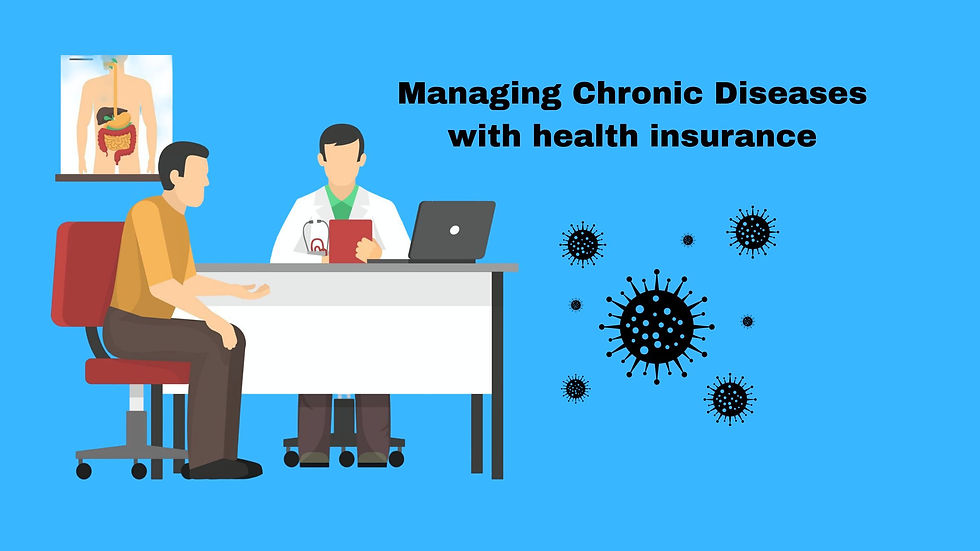Managing Chronic Diseases with health insurance
- Leads @btwimf.com
- Mar 24, 2025
- 2 min read
Updated: Apr 3, 2025
Chronic diseases like diabetes, heart conditions, and asthma require ongoing medical care, which can be expensive. Having health insurance helps manage these costs and ensures continuous treatment. This article explains how to manage chronic Diseases with Health Insurance, the benefits of coverage, and how to choose the right plan.
1. Importance of Health Insurance for Chronic Diseases
Managing long-term illnesses requires frequent doctor visits, medications, and medical tests. Health insurance helps by covering:
Regular check-ups and specialist consultations
Prescription medications
Diagnostic tests and treatments
Hospitalization costs
Without insurance, these expenses can be a financial burden.
2. Coverage for Long-Term Treatments
Chronic diseases often require lifelong treatment. A good insurance plan will include:
OPD (Outpatient Department) coverage for routine check-ups
Hospitalization benefits for emergencies and complications
Home care and rehabilitation services
Choosing a plan with these benefits ensures comprehensive care.
3. Pre-Existing Disease Coverage
Many insurers cover pre-existing conditions after a waiting period of 1-4 years. When selecting a policy:
Look for a plan with a shorter waiting period
Check if your disease is included in the coverage list
Understand the renewal terms for pre-existing conditions
This ensures you receive treatment without unnecessary delays.
4. Regular Health Check-Ups and Preventive Care
Many policies offer free preventive screenings and check-ups, including:
Blood sugar and cholesterol tests
Heart disease screenings
Cancer detection tests
Early detection and management can help prevent complications.
5. Medication and Treatment Cost Coverage
Chronic diseases often require expensive medications. Health insurance helps by:
Covering prescription drugs
Providing discounts on long-term medications
Offering cashless pharmacy benefits
Check your policy for medication coverage to avoid high costs.
6. Cashless Treatment at Network Hospitals
Most insurance providers have tie-ups with hospitals for cashless treatment. This means:
You don’t have to pay upfront for medical care
Bills are settled directly by the insurance company
Better access to specialized hospitals and doctors
Ensure your preferred hospital is on the insurer’s network list.
7. Critical Illness Coverage
Some policies offer a separate critical illness cover for severe chronic diseases like:
Cancer
Stroke
Kidney failure
This cover provides a lump sum amount to manage high medical costs.
8. Alternative Treatments and Wellness Programs
Some policies cover alternative treatments like Ayurveda, Homeopathy, and Yoga. These help in:
Managing stress and improving overall health
Reducing dependency on medication
Enhancing quality of life
Check if your insurance policy includes alternative treatments.
9. Tax Benefits on Health Insurance
Under government tax policies, having health insurance allows you to:
Get tax deductions on premium payments
Save more money while securing your health
This makes insurance a financially smart decision.
10. Choosing the Right Health Insurance Plan
When selecting an insurance plan for chronic disease management, consider:
Coverage for your specific condition
Waiting period for pre-existing diseases
Cost of premiums vs. benefits provided
Network hospitals and available treatments
Choosing wisely ensures stress-free medical care.
Managing chronic Diseases with Health Insurance helps reduce financial stress and ensures continuous treatment. From medication coverage to preventive care, the right policy offers peace of mind and better health outcomes.











Comments